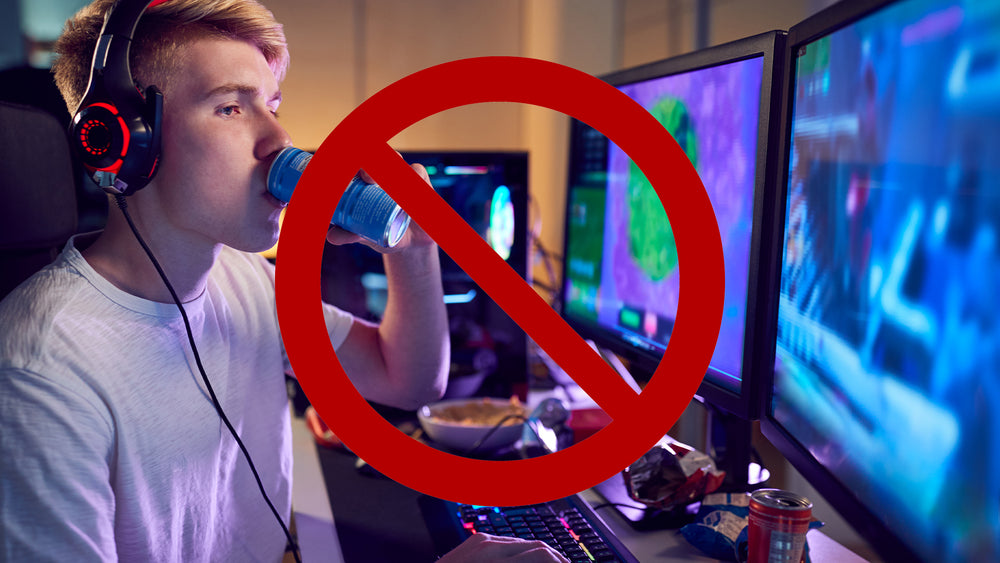We all know about eating quality foods and fewer calories to control our weight. But is there anything else you can do at the dinner table to improve your chances of losing weight and living longer?
The type and amount of food you eat are the most important aspects of a healthier mealtime. Food is only part of the equation, however. How fast you eat, where you eat and who you share meals with, can make a difference in your weight, digestion and overall health.
Eating Too Quickly Makes You Eat More - And Enjoy Your Food Less
Gulping down food on the go makes you eat more, and may cause digestion problems. When you eat fast without chewing thoroughly, you don’t give your body enough time to sense that you’re full.
Your brain must signal that you’ve eaten enough – satiation after a meal isn’t due to merely filling up your stomach. Digestive hormones from your gastrointestinal tract let your brain know you’re full. The vagus nerve that links your stomach and brain helps notify you to stop eating.
Leptin, a hormone produced by fat cells, boosts signals emitted by cholecystokinin (CCK), a hormone released by the intestines after you eat. Leptin increases the CCK signals to amplify that full feeling. Leptin may also combine with the feel-good neurotransmitter dopamine, to make you feel happy during or after a meal.
By eating too quickly, you may rob yourself of these necessary hormone interactions. You’ll prevent your body from signaling that it’s full, and deny yourself that feeling of pleasure you get after a leisurely meal.
While some people may have leptin resistance, which makes it hard for them to know when they are full, most people can change their eating habits.
Chewing slowly may not help you lose significantly more weight, but it will help you enjoy your food more and aid digestion.
If you eat alone at your desk or in front of the TV, and combine that with fast eating, you’ll be more prone to gas, bloating and acid reflux. Since you won’t secrete enough saliva if you eat quickly without thorough chewing, the food pieces will be larger and may not be fully digested. Studies have also found a link between obesity and fast eating
Improve your digestion and avoid bloating by with slow eating. Taste and smell your food. Take time to enjoy it like you would many other pleasures in life. Put utensils down between bites and do anything you can do to slow down your eating. Eating with others is actually good for your digestion and mental health, as it encourages camaraderie. Working alone at a computer, playing video games, watching TV and multi-tasking while you eat will make you eat more.
The Health Benefits of Eating Meals with Others
Eating alone has become the norm. Kids and parents don’t share home-cooked meals at the same table much anymore. Everyone eats different foods at different times. This is more convenient, but it’s not healthier.
You’ll eat less if you are with other people. You’ll talk more and won’t be so focused on the food alone. Forging and strengthening bonds with others makes you happier and more sociable away from the dinner table.
More Healthy Eating Tips
- It is okay to leave food on your plate. You may remember your Mom or Grandma admonishing you to finish all your food because food costs money. Forget about the cost of the food or the amount left on your plate. You can always save the food and eat it later in the day or the next day.
- You should use smaller plates for meals. You’ll be more likely to finish all your meal and not feel bad about leaving bits behind.
- Eat every three to four hours even if it’s just a snack. Controlling hunger pangs prevent you from indulging later.
- Raw food, stale toast and spaghetti that has been in the fridge for two days will contain fewer calories than hot foods right out of the oven. Don’t avoid hot food in the hope of losing more weight quickly. You’ll only save a few more calories by eating raw food or day-old bread, but you can eat these foods occasionally to deduct calories from your weekly amount.
- Research still says breakfast is the most important meal of the day. You don’t need to eat steak and eggs, but do include some kind of protein to start your day and stay slim.
- If you like to snack or eat smaller meals throughout the day, you still need to plan what you’re going to eat and when. Bring fruit or bags of trail mix and air-popped popcorn to work. You’ll less tempted to buy candy bars from the vending machine or make a run to the closest fast-food restaurant if you eat healthy snacks a few times during the work day.
Solitary Eating and Your Health
A Korean study showed that men who ate alone twice a day were more susceptible to metabolic syndrome which leads to diabetes heart disease. Eating at your desk or in the front of TV can’t be helped once in awhile, but it can have harmful repercussions if you do it too often.
There’s a link between loneliness and poor health. Many studies indicate that people who have poor social support networks are less likely, to follow through on goals, including healthy eating.
If you live alone, you probably eat takeout or microwavable meals, and are less apt to take the time out to prepare fresh meals from scratch. When eating solo is unavoidable, try these tricks to make it healthier and more fun.
- Subscribe to a meal service. You can get full meals or ingredients and recipes with cooking directions this saves you time shopping or ordering,or sitting in a restaurant.
- Learn how to cook favorite recipes from your childhood whether it's the lasagna Grandma made, or your aunt’s meat loaf. You can adjust the recipe for one person or save the extra portions for another day. Bringing back happy memories of childhood meals will alleviate monotony of eating alone.
- Eat lunch outdoors in the park or in the courtyard at work or in your apartment building, weather permitting. You’ll get fresh air and may get a chance to talk with neighbors or co-workers.
Why Eating With Other People Is Better for You
Eating with your spouse or family is good for you psychologically, as well as nutritionally. A Harris Poll shows that families eat together less than five times a week. Here’s a rundown on how eating with your family improves your life and the lives of those around you.
Kids may do better in school.
Parents learn more about what their children are doing in school, sports and in other extracurricular activities. They can keep track of homework assignments and school happenings, which will help kids complete homework and get better grades.
Reduces weight gain or loss for adults and kids
Since parents have the say in what’s for dinner, kids will be saved from eating junk food or fast food on the run. If a child has bulimia or another eating disorder, parents will be better able to notice it before it does damage.
Home-cooked meals contain fewer calories and will help control weight gain more effectively than junk food or fast food.
Everyone saves money.
Eating a home-cooked meal together saves money on expensive restaurant meals, tips, gas driving to and from restaurants. Kids can save more money for fun stuff and parents will notice an increase in household budget.
Home-cooked meals are more nutritious.
Family meals made from fresh whole ingredients have more nutrients, including calcium, fiber and iron. Home-cooked meals are more likely to include vegetables, beans, grains and foods from all food groups.
Since home-cooked meals don’t contain preservatives, high-fructose corn syrup or excessive amounts of salt and sugar, they won’t contribute to stomach problems, cancer or heart disease.
Eating together strengthens family bonds and prevents depression.
Spending more time with parents makes kids less likely to seek guidance from the “wrong crowd.” Good communication between family members helps prevent teen alienation, drug use and depression. Of course, it’s best to keep mealtime discussions fun and light. If any family member has serious issues they want to talk about, they should be addressed in private after everyone has left the dinner table.
Meal Time in Other Times and Other Cultures
In France, Cambodia and many other countries, people take time to eat and often do it with friends and family. As a result, they strengthen family bonds and develop close friendships with neighbors. In some small towns in Mexico, people eat dinner in the town square with their family and neighbors.
Eating at the dinner table was a staple of America in the mid-20th century. Everyone was expected to be at the table at a certain time, and children were often expected to help prepare dinner, set the table or wash dishes. It was an everyday occurrence. People sometimes visited Grandma and Grandpa on weekends for a special dinner and a visit with the extended family. It wasn’t just a once a year visit for Thanksgiving or Christmas; it was an ongoing thing.
Once the center of family life, the dining table has now been replaced by fast food, delivery meals and eating solo in front of the TV. The ritual of dinner time with family and friends is too time-consuming or inconvenient for many people. As a result, many us experience weight gain, poor nutrition and less quality time socializing.
The Time of Day You Eat Affects How Your Body Processes Food
The time of day you eat your meals makes a difference.
Some people crave more carbohydrates late afternoon and evening. In one study, late eaters lost less weight than subjects who ate lunch before 3 p.m. Late eaters also tended to skip breakfast, which is considered the most important meal of the day by many health experts.
A study of overweight women divided research subjects into two groups – one group ate a big breakfast and small dinner, the other group consumed more calories at dinner and had a small breakfast. The group that ate a bigger breakfast lost 2.5 times more weight than the group that ate a big dinner.
The early eaters had a 33% drop in triglycerides, while the late eaters had a 14.6% increase. Eating earlier in the day offers you protection against gaining weight, heart disease and diabetes.
The 24-hour biological cycle known as the circadian rhythm affects your mental and physical behavior. Your circadian rhythm responds to changes of light and dark in your environment. This biological clock determines your hormone, enzyme and glucose levels during different parts of the day.
How your body metabolizes food energy at different times of day will affect your weight, blood sugar, and cholesterol. Take care to always eat breakfast and a low-carbohydrate dinner, with a healthy lunch of protein, non-starchy veggies and high-fiber carbs in between.
Spreading out meals or snacks over the entire day is better for your health than bingeing in the morning or at night and neglecting to eat the rest of the day. You can choose to eat five small meals or three larger ones, depending on what works best for your schedule and your appetite. If you eat substantial amounts at breakfast and lunch, you probably won’t snack or overeat in the evening.
Simple, home-cooked meals eaten with family provide the best nutrition, taste and comfort. If you like more complicated gourmet food, go for it, just remember to eat your culinary creation with others for maximum benefits.
How to Eat for Better Health
Learn how to eat well by selecting fresh, whole foods and preparing well-balanced meals at home. Eat the right amount of foods slowly, at the right time of day, with friends or family, will increase the healthy properties of the food.
Happy Girl Mood Enhancer from Wheatgrass Love combines wheatgrass and a proprietary blend of herbs to balance your emotions naturally. Wheatgrass has all major vitamins and minerals, plus hundreds of enzymes and amino acids. Happy Girl’s proprietary blend contains green tea extract and gotu kola to increase energy and promote a sense of well-being, along with close to a dozen other herbs. Learn more about Happy Girl here.
















